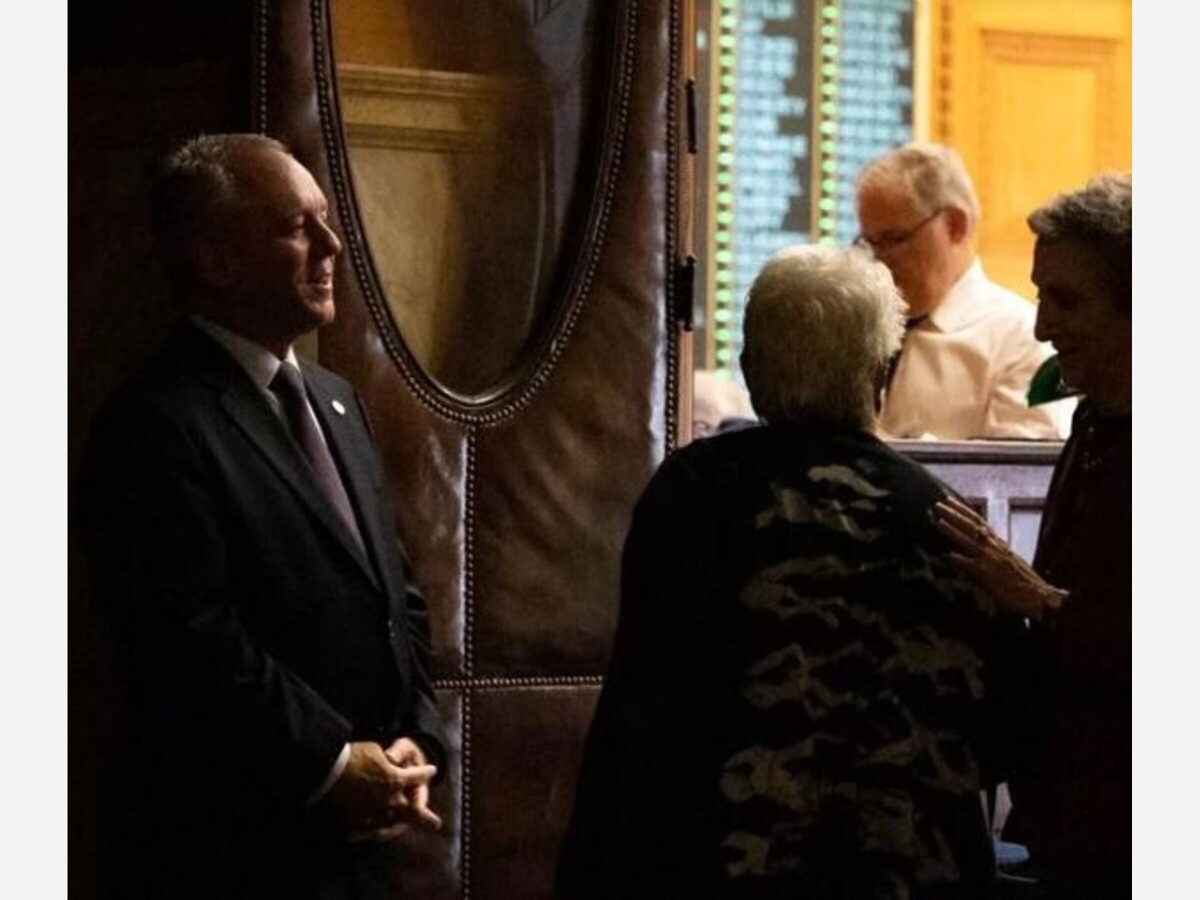Image

Rep. Jeff Roy (left), talks with Reps. Kay Khan and Ruth Balser (right) in the House Chamber. (StateHouseNews file photo)
The Massachusetts House was split along party lines Wednesday night in voting to support climate and energy legislation that would "help accelerate the green transition," according to the bill's lead architect.
"The bill before you continues this commitment to empower municipalities as trusted partners and foster local control. It will bring local expertise and innovation to the table and will help accelerate the green transition," Rep. Jeff Roy, chair of the Committee on Telecommunications, Utilities and Energy, said during opening floor remarks on Wednesday afternoon.
The bill passed around 7:30 p.m. on a 131-25 vote with every Republican in the chamber opposing the legislation although no Republican stood to speak on the bill at any point during Wednesday's hours-long deliberations.
Climate change is often pointed to by public officials as a major issue facing society, but few Democrats opted to publicly debate or discuss the bill, with only two legislators making brief statements on amendments that were quickly approved.
The 107 amendments to the bill were dealt with quickly and without much debate. Roy spoke at length about the details in the underlying bill that is meant to simplify and limit the duration of permitting processes to ensure that new clean energy infrastructure can be built.
Roy cited clean energy infrastructure delays stretching from five to ten years, and "the often duplicative processes and the inaccessible proceedings for host communities."
Rep. Steven Owens of Watertown spoke in favor of the bill, saying that each of those years of delay to permit new clean infrastructure is another year of climate change worsening.
Owens wore a tie with blue and red stripes. He said each thin line represented a year over the last century demonstrating Massachusetts' temperature, with blue stripes representing colder than average years and red stripes for years when temperatures were high.
"From last session, I've had to add two more red stripes. Two more years hotter than average, and two more hotter than ever," he said. "We don't have to wait for clean energy projects. This bill will help streamline the permitting process. We've heard of projects taking up to 10 years going through permitting and review. Ten years of red tape, 10 years of more red stripes, 10 hotter than normal years."
Owens spoke about a section of the bill modeled after a bill he filed to allow natural gas companies to sell and distribute utility scale non-emitting thermal energy, including network geothermal and deep geothermal energy.
He said by changing the definition of a gas company, National Grid and Eversource could more easily launch new pilot programs to generate energy through ground source heat pumps, and the language "keeps the doors open for other innovations beyond geothermal."
The provision will help "future-proof the utilities and the industry writ large," Owens said.
In his opening remarks, Roy discussed highlights of the bill, including: consolidating permitting at both the local and state levels, setting 12- to 15-month limits for the issuance of all final permitting decisions; streamlining the appeals process; establishing community engagement requirements for developers; creating guidance on the suitability of sites for future energy infrastructure development.
It would also clearly delineate between local and state authority to approve these infrastructure projects, allowing small clean energy projects under 25 megawatts and small energy storage systems under 100 megawatts to be under the control of a municipality, which would be required to issue a final decision within a year of receiving a permit application. The bill includes a number of provisions to provide resources and technical support to municipalities who need state approval for projects, or to do their own local reviews.
The Healey administration helped craft the siting and permitting reforms in the House and Senate bills with input from top lawmakers.
The Senate took up its version of the bill in late June and sent it to the House on July 1.
Though both branches agree on the need to reform the siting and permitting process, the House bill calls for the procurement of 9.45 million megawatt-hours of clean energy, including from nuclear generation, as well as 5,000 megawatts of energy storage -- neither of which feature in the Senate bill.
The Senate bill includes changes to the wind procurement process that the House dropped in their version.
"What they sent was a far more expansive bill beyond the siting and permitting work, and contained some provisions that have not been subject of public hearings," Roy said during his Wednesday speech. "So it required more study and an expansive response."
With approval from both chambers, the bill will now likely head to conference committee where negotiators will have less than two weeks to come to a compromise before the end of formal sessions for this two-year term.
Roy and Barrett made headlines earlier this session by having such significant disagreements that they conducted hearings on energy policy separately, rather than function as a joint committee. If a compromise surfaces after July 31, any single opponent of the bill could block it from advancing during the regular informal sessions that will be held over the last five months of 2024.